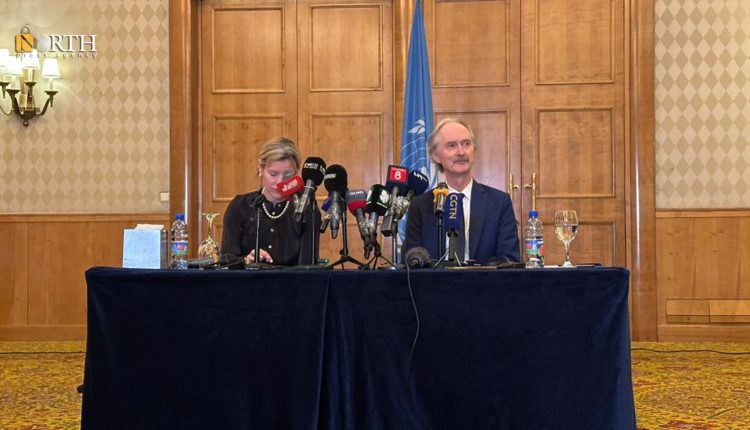UN Envoy Pedersen: Syria–SDF Agreement a “Key Opportunity” for Northeast Resolution
By Kardo Roj
DAMASCUS, Syria (North Press) – United Nations Special Envoy to Syria, Geir Pedersen, said on Wednesday that the recent agreement between the Syrian government and the Syrian Democratic Forces (SDF) offers a significant opportunity to address the longstanding file of northeast Syria.
Pedersen’s remarks came during a press briefing in Damascus, marking his latest statement on the evolving political landscape in Syria following the collapse of the previous regime nearly five months ago.
“This agreement represents a chance to make meaningful progress toward a political and inclusive resolution in the northeast,” Pedersen stated, while also emphasizing the need for Syrian-led initiatives to reduce tensions and reinforce national unity.
Although details of the agreement have not been made public, sources close to the matter suggest the framework includes provisions for joint administrative coordination, security arrangements, and preliminary discussions on constitutional amendments relevant to the Autonomous Administration of North and East Syria (AANES).
The SDF, a key actor in securing and stabilizing northeast Syria throughout the conflict, has maintained de facto control of the region through its alliance with the AANES. The UN and other international stakeholders have long viewed the region’s stability as critical to any broader Syrian political solution.
Pedersen also addressed ongoing security concerns, condemning repeated Israeli airstrikes in Syria as “unacceptable” and calling for respect for Syria’s sovereignty, unity, and territorial integrity. He reiterated the UN’s commitment to working closely with Syrian institutions in support of national reconciliation and post-conflict rebuilding.
Regarding recent developments along the Syrian coast, Pedersen noted that a fact-finding commission established by the Syrian government continues its investigations into recent incidents, and he emphasized the importance of ensuring that weapons are held exclusively by state authorities.
He further stressed the importance of inclusive governance moving forward, advocating for the creation of a national committee to oversee upcoming parliamentary selections. According to Pedersen, this body is expected to be tasked with implementing constitutional reforms tailored to Syria’s transitional phase.
In a broader message, Pedersen highlighted Syria’s history of coexistence and called for combating hate speech while promoting national dialogue. “President Ahmad al-Shara has underscored the value of Syria’s pluralistic identity,” he said.
The UN envoy concluded by underscoring the need for continued disarmament and reintegration efforts, referencing the variety of military factions still operating in the country. “Syrian-led efforts must continue to reduce armed tensions and ensure sustainable security,” he said.
The agreement between Damascus and the SDF marks a rare public acknowledgment of cooperation between the two sides, potentially setting the stage for more structured engagement within the framework of Syria’s ongoing transitional process.

